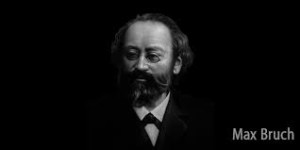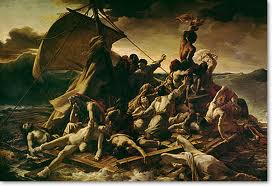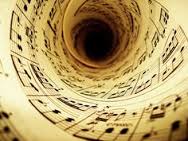Max Bruch, German composer of the Romantic Era, wrote over 200 works. Ask any violinist and they’ll nod, maybe even roll their eyes, saying “of course, the violin concerto. Played it. Everyone student has.” Or heard it. Or heard Bruch’s celebrated Kol Nidrei for Cello and Orchestra. Or his Scottish Fantasy for violin and orchestra. And that sums up Bruch for most.
Bruch wrote two more violin concertos, that, possibly, you’ve never heard (not to mention a gorgeous Serenade for Violin and Orchestra). He wrote three symphonies that, likely, you’ve never heard. I’m listening to the second one right now. It’s cracking my heart open.
The problem with poor Bruch was, you see, he was born too late. He had to follow in the footsteps of German masters of the Romantic Era such as Beethoven, Schumann, Mendelssohn, Brahms. He learned a lot from them. He loved their structured, balanced, lyrical style; it was what he did best. However, by the time Bruch had a really good sound going, the times, they were a-changing. A new kind of Romantic music was piquing the interest of the public, the more flamboyant, passionate styles of Tchaikovsky, Mahler, Wagner, Bruckner. Bigger orchestras. Bigger risks. Bigger sound, larger than life drama and pathos and redemption all built in.
And like that, the tides had shifted. While Bruch continued on with a successful career, composing, teaching, conducting, what have you, history turned its back on him. It cast him as a side note to the masters and deemed his repertoire, with the exception of his violin concerto and Kol Nidrei, largely forgettable. Not music you will hear too frequently in today’s concert halls.
I love Bruch’s other violin concertos, his Serenade for Violin and Orchestra (op. 75), his Romance for Violin and Orchestra (op. 42), his Im Memoriam (op. 65). And his symphonies. The No. 2 in F-minor, in particular. The second movement. I am utterly smitten. I play it over and over and it’s as if I can feel the spirits of Schumann and Beethoven. They are hanging out with me here as I sit and listen. Check it out.
Where did it come from, this music? What made Bruch write the movement this way, with those swirls of otherworldly emotion, so very much like Schumann’s own Symphony No. 2, third movement? It’s uncanny. I get that same prickly feeling, both elated and close to tears, and it’s like I’ve consumed a shot of something heady, like antique scotch, and instantly my emotions are running higher, as as are my thoughts, my analysis of the music. There is an increased need, almost frantic, to get it right, to explain it all with words. To say, “Folks, this one is a gem. You have to hunt down a copy and give it a good listen. This is pure genius.” No, wrong word. It wasn’t pure genius, pure originality on Bruch’s part. I’d have to give those awards to Mozart, Beethoven, Schumann. But what Bruch produced, is art, that seems to give off an invisible radiance, one you can feel on your flushed cheeks, deep within your heart as you listen. This is art that got overlooked because it came just a little too late in the cycle of things, in the relentless push of progress, seeking out a new sound, something less classically romantic, more gritty and provocative.
The second movement plays for eleven minutes. For that time (because of course I am listening to it yet again), I will once more puzzle over what makes it work, what is seizing my heart, keeping it hostage. I will come back tomorrow, play it again and again, in the hopes that at some point I will find the clues required to unlock that place, release me from this obsession. And maybe, through that, I can crack the nut of why classical music, and art, affects me as it does.
I think the joke’s on me, though. Art can never be unlocked, un-cracked, figured out. And lucky us, for that. It means we can spend our lifetimes exploring, searching, falling into it, loving it.
**
PS: My heartfelt thanks go out to violinist Salvatore Accardo and his lovely, loving renditions of so much of Bruch’s music. He has my undying devotion. Here are two beloved CDs I own and would highly recommend:
http://www.amazon.com/Bruch-Complete-Concertos-Scottish-Fantasy/dp/B0000069CT



I am only learning classical music and find your description of Bruch’s music, along with the other masters, to be instructive, interesting and even inspiring. I find that if I first learn about a composer, I tend to appreciate the music much more readily. Now it’s time to listen. Thank you!
Kathleen – I would highly recommend Bruch to a newcomer to classical music appreciation. He’s got a familiar, melodic sound that makes you feel like you’ve heard the piece before, or that you’ve wanted to (if that makes any sense). If you’ve been exposed to Tchaikovsky and Brahms, he lies there in the middle. Or at least that was my feeling. I hadn’t listened to him prior to picking up the violin in 2005. His first violin concerto is well-tromped terrain for any violin student who made it to concerto-playing level. Some Violinist.com members roll their eyes and say “heard it too many times, heard it played poorly too many times.” In truth, that’s how I feel about most of Tchaikovsky’s Nutcracker. Heard it way too many times from performing in it. Sorta roll my eyes now when I hear it. Except for the Entr’act, I think it’s called, the lovely music between first act and second.
Whoops, I digress. It’s just so much fun for me to talk about classical music, though. Now that I think of it, it’s how some women are about shopping, about the things they saw, or bought, the colors and silky textures, and the good feeling when trying it on, so to speak.
Oh boy, I’ll end here. But thank you for your comment, and please do give Bruch a try. Start with the 3 violin concertos, using the above links. Good stuff.
Okay, I have to listen to him! The Romantic composers are my very favorites, as you know. And classical music does the same thing to me. It grabs me, and holds me captive and I “see” as I listen. (but not the case with baroque!) Like Smetana’s Ma Vlast, which is my most recent favorite… 🙂 Before that it was Dvorak. And now that I’m studying the Czeck language I understand how his name can be pronounced Dvor-zshak.
Yes, do. His music is lovely. He’s done lots of violin music – check your local library and I imagine they’ll have a CD with violin concertos 1, 2, 3, or his “Scottish Fantasy.” One of my faves is his “Serenade for Violin and Orchestra.” I think the CD I have is a 2 CD set, featuring Salvatore Accardo on the violin. He’s just wonderful.
Whoops, I’m repeating myself. That’s what happens when you comment on an old blog, I suppose!
Okay, take that advice above, and check out the CD. You’ll like it, I’m sure of it.
Poor Bruch – Written off, almost ‘condemned’ by his first violin concerto, the Scottish Fantasy and Kol Niderei people forget his other works as you have pointed out – his romances for violin and orchestra, his other violin concertos and the glorious ‘in Memoriam’ ( the Salvatore Accardo recordings of his entire works for violin and orchestra are well worth looking out for). As to the symphonies his first is very classical and an early work but I have always loved his second symphony – the first movement being very dramatic and the second, as you say, exquisite. The third movement perhaps is a little lighter weight and not quite up to the first two movements, but tuneful. One cannot but hope a long lost piano concerto might be found one day. Bruch did write one for two pianos which is perhaps just a little corny / catchy but there are some great ideas within it
Love all these thoughtful, insightful comments, Iain! Thanks for taking the time to share them. Ooh, a long-lost piano concerto. Something fun to dream about (along with a Grieg Violin Concerto). I will have to hunt down the aforementioned one for two pianos; don’t think I’ve heard it.
I adore Salvatore Accardo’s recordings of Bruch. Is there any violinist who’s done a better, more comprehensive job on Bruch? Can’t imagine.
Thanks again for posting!
One more thing to add: Bruch is very much beloved by violists. His Romance for Viola and Orchestra is a staple of the solo viola repertoire, and his Double Concerto for clarinet, viola, and orchestra is one of the finest double concerti by any composer. And there’s also his Eight Pieces for Clarinet, Viola, and Piano.
Andrew, I’m so excited to read your comments because you’ve just given me new music to listen to! I’ve listened to the “Eight Pieces” and maybe the Double Concerto but maybe not. But I know I’ve never heard the Romance for Viola and Orchestra. Oh, YAY! Off to procure a copy of that. Thank you SO much for taking the time to share your comments!
I am another big fan of Bruch’s music. If you still haven’t heard the Concerto for Two Pianos, I recommend it.
The Adagio of Symphony No. 3 (IMO) is one of the most beautiful slow movements that anyone ever wrote. The horns at the end give me chills. And I have listened to it countless times.
I just discovered your website. Thanks for writing about music!
Love all your comments, Carol! Yes, I DO have to hear that Concerto for Two Pianos. Am going to Youtube it this very moment!
Love your comments about the Adagio of Symphony No. 3. That’s precisely how I feel about the slow movement of No. 2. What an amazing composer he was, to so stir us, individually and collectively, over a century ago.
The slow movement of Number 3 IS great! Have you heard the Konzertstück in F Sharp Minor? It reminds me a bit of The Scottish Fantasy, which is another of my favorite pieces of music.
I spent most of yesterday afternoon (dreary and rainy here) reading your classical music blogs. I love so many of the works you’ve written about. I hadn’t seen the YouTube clip of the string quartet playing part of Dvorak’s American quartet on the plane; I got a huge kick out of that. Dvorak is another of my favorite composers. I live in Iowa and have never visited Spillville, where Dvorak lived one summer while he was in America, but I WILL get there, soon. His cello concerto was my gateway to Romantic era music; saw the Des Moines Symphony perform that about 2 years ago with Joshua Roman.
Yes, Carol, agreed that the Konzertstück in F Sharp Minor sounds like Scottish Fantasy. Also it’s like his Serenade for Violin and Orchestra that I’m CRAZY about.
So much fun to talk about classical music with you, Carol! Is Spillville where Dvorak wrote “The American” quartet? I’m thinking so.
Yes, Dvorak wrote the American Quartet in Spillville. My dad has been there several times (I got my love of Dvorak, Brahms, Tchaikovsky, Schumann, and others from him). The house the Dvoraks lived in is still there.
I know very little about ballet, but would like to know more! I found a You Tube clip of the NYC Ballet performing Serenade after seeing a reference you made to it. I had never seen it before and loved it.
I have no one to talk about music with except my dad, so thanks for talking about it with me!
Carol, regarding ballet – you should put “attend a performance of Swan Lake” on your bucket list. It’s not just iconic ballet, the music (by Tchaikovsky) is just so stunning, it’s a double treat for anyone who loves classical music. But make sure it’s a big touring company or any “big” company versus a watered-down version. A bad Swan Lake would probably be worse than none (because, truth is, we can always seek out a quality recording.)
Done! And I will delete this comment and yours (asking me to delete) at some point, but wanted to let you know in advance – and respond to your comment.
Regarding ballet – you should put “attend a performance of Swan Lake” on your bucket list. It’s not just iconic ballet, the music (by Tchaikovsky) is just so stunning, it’s a double treat for anyone who loves classical music. But make sure it’s a big touring company or any “big” company versus a watered-down version. A bad Swan Lake would probably be worse than none (because, truth is, we can always seek out a quality recording.)
Could you recommend a DVD performance of Swan Lake for me? It is unlikely that I will ever get to see a quality live performance, however much I would like to. Tchaikovsky’s ballet music is so good. As far as that goes, most of his music is really good.
Carol, maybe try this one? It is considered a “complete” version, which makes it more true to the ballet, although others will argue the shorter versions preserve the most interesting parts and leave out the extraneous. But if you want to know what the ballet audiences here, this would be the way to go.
http://a.co/1WgZRxL – André Previn, conducting
This recording is older, digitally remastered, and I’ve seen comments that the older recordings impart more artfulness to the equation. Conductor here is Wolfgang Sawallisch – http://a.co/dxmieqn
All right, there are two good options for you! Let us know your thoughts. Maybe I should make this topic be a blog of its own – the listeners’ guide to Tchaikovsky’s ballets. After all, for many of us, listening to the recordings might be as close as we get to the ballet. Or it might be listening exposure that predates the live viewing experience by 30 years (guilty as charged!).
Just caught this — thanks for putting this in non-Wikipedia-fied language! Lovely!
You’re welcome Matt, and thank you in return. I always love to read comments like yours!